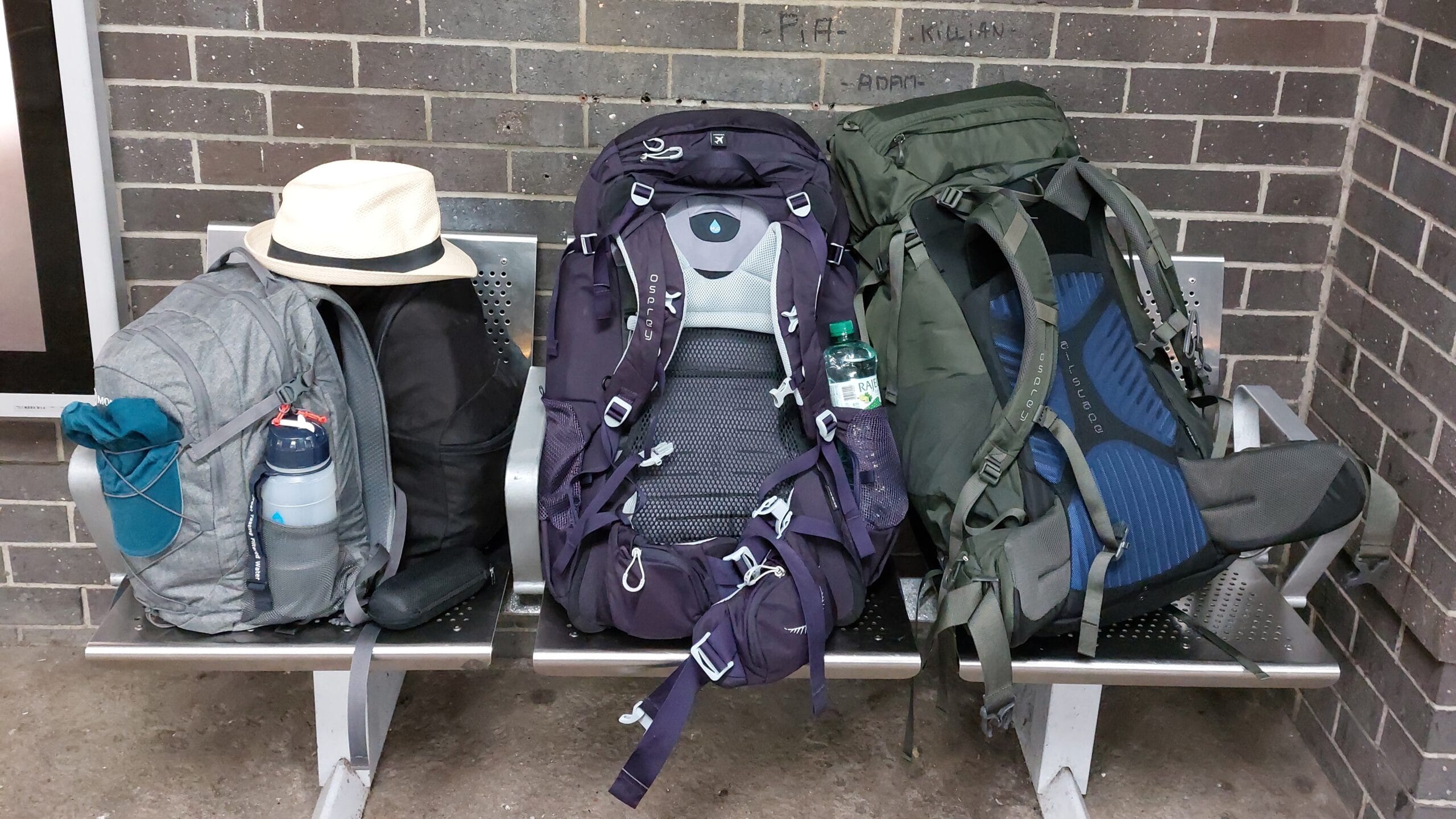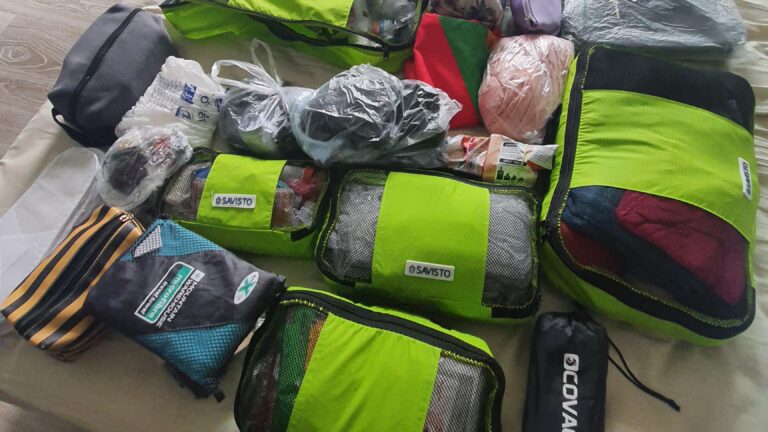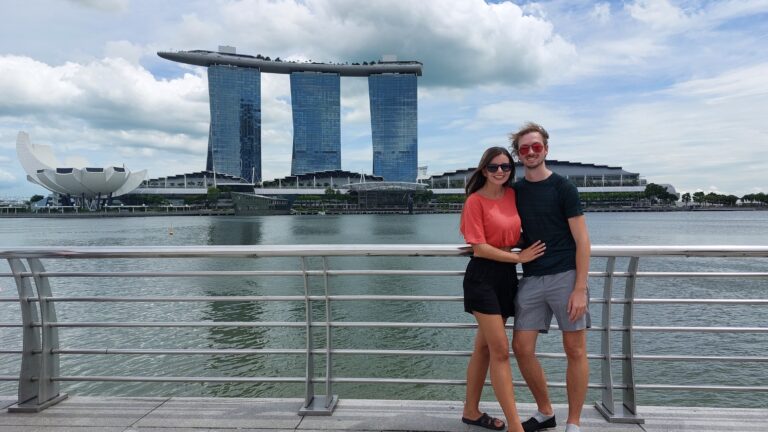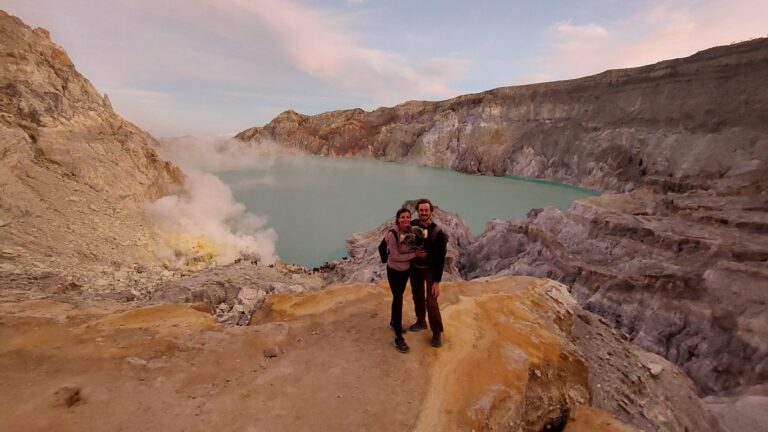Are you dreaming of quitting your job to explore the world, but are you wondering: how on earth do you prepare for full-time travel??
Where do you start? And what do you have to actually do? And how do you just lock your flat one last time and leave for a year? Or two? Or forever?
Don’t worry, it’s perfectly normal to feel overwhelmed when it comes to preparing for long-term travel.
It’s a mammoth task, but one that can be managed and, most importantly, will be worth it, when you are sipping a Pina Colada on a beach in Italy (quick question, Pina Coladas – yes or no? We are split on this one – Daniel likes them while Mirka finds the coconut-pineapple combo yucky. Let us know in the comments below!).
In this post, we’ll take you through all the things you’ve got to think about (and actually do) so you can prepare for long-term travel – without losing your sanity in the process!
This post may contain affiliate links. For more information, please read our Disclaimer.

Here’s a little bit about our journey, if you are new here! If you know us, feel free to skip this part.
After leaving our old life in Scotland in March 2022 (it rains too much there), we travelled full-time for almost 2 years. Sounds fancy, doesn’t it? Well, it was. If you think that carrying overpacked backpacks in 45°C heat around streets that aren’t even on Google Maps is fancy. And that’s just 1% of all the fun we had! 😆
During the 2 years we volunteered in Italy and Bulgaria (free travel while learning new skills, anyone?), explored other amazing European countries and backpacked Southeast Asia. Btw, even our secret wedding was more of an expedition than a wedding. 😅
And, of course, we researched and planned everything ourselves, because you gotta keep the budget low, right? If you are like us, you’ve come to the right place, because we want to share all the useful travel tips and info with you!
Excited? Good. Let’s get into it so you can go on your own epic adventures too!
How to prepare for full-time travel
We’ll be honest with you.
This is a big task.
Planning any trip is a lot of work.
Planning full-time travels, though, is a full-time job. Except, you will, most likely, have to manage it WHILE also doing your actual full-time job.
This is why we wrote this post. To help you along the way.
First, a little warning though.
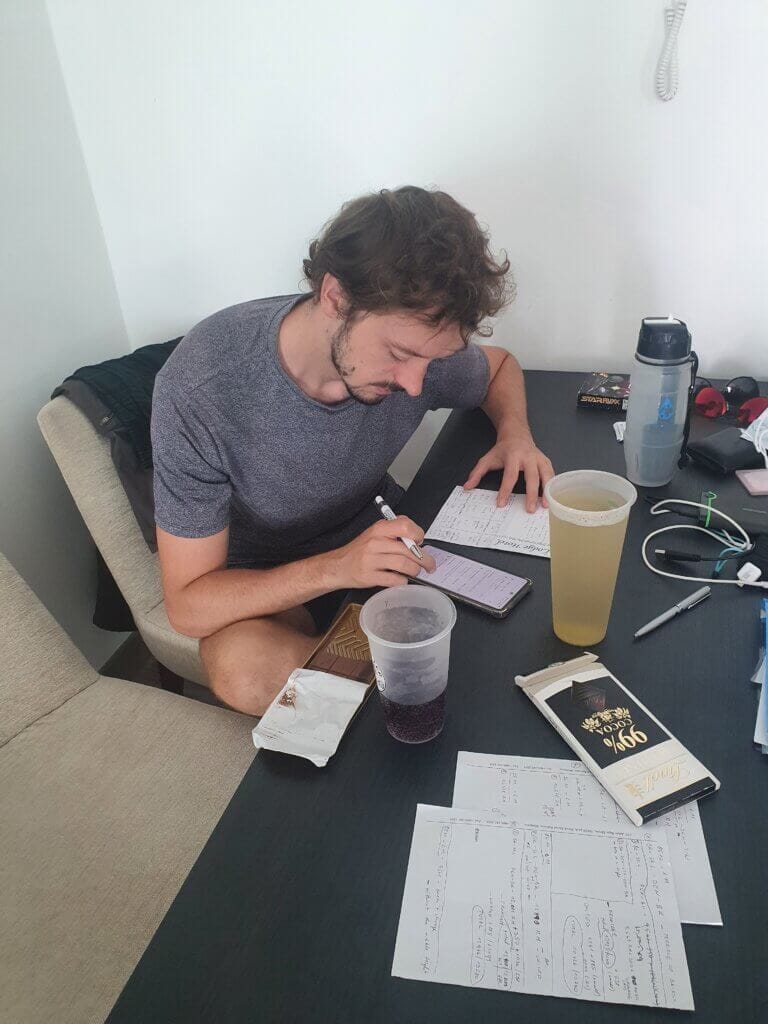
Warning
This post is long. Like really long.
Why?
Because we wanted to cover everything, to make sure you know how to prepare for full-time travel without having to do all the research yourself.
We would suggest you don’t try to read it all in one go – you’d just fry your brain and end up breathing into a paper bag by the end, most likely.
What is a better idea?
Saving this post – in your bookmarks, perhaps – and using it as your guide.
Read a bit every day as you progress with planning your full-time travel journey.
That way, you won’t get overwhelmed – every day, we will be here with you, taking you through the process one step at a time.
So save this post and stay sane when preparing for full-time travel!
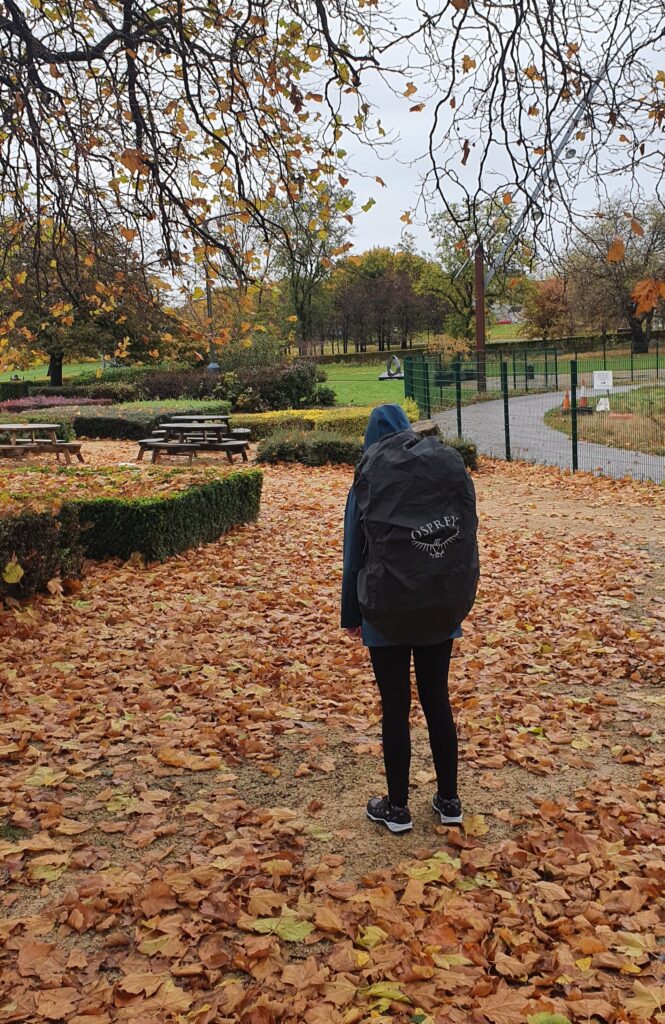
Tips to prepare for long-term travel
- Start early. If you think you fancy full-time travel in the future, get started now.
- Stay organised from the start. Create a system that works for you. There will be a lot of information to note down. How will you make sense of it all?
We had multiple Google Sheets and Docs where we noted down everything. The key? Knowing where to find things when you need them. - Remember the goal. Things will be tough. Saving money for full-time travel is a painful process. You might encounter so many obstacles – we felt like every day a new issue came up.
The important thing is to remember why you are doing all this. Write about your full-time travel dream in your journal, so you can reread it when you need it. Create a vision board for your full-time travel life. Make a pinboard with encouraging notes. Whatever reminder works for you, to keep you on track as you prepare for long-term travel. - Try not to panic. There is always a solution (you might just not always like it). If it all feels like too much and you are overwhelmed, maybe postpone your departure a bit and give yourself more time to prepare.
This is why we would suggest you: start early, understand what you need to do (by reading posts like this one), make an approximate timeline for saving up money and the tasks you need to do, be realistic and, lastly, don’t quit your job until you are more-or-less ready to go.*
*This, of course, depends on your notice period. You don’t have to wait till you have your backpack packed and your flat notice is up to start your 3-month work notice period. That would be crazy.
But equally, don’t give up your job and then discover you still need to save up £3,000 to pay for all the gear and travel insurance – that would also be crazy.
And we only support the good crazy stuff on here.
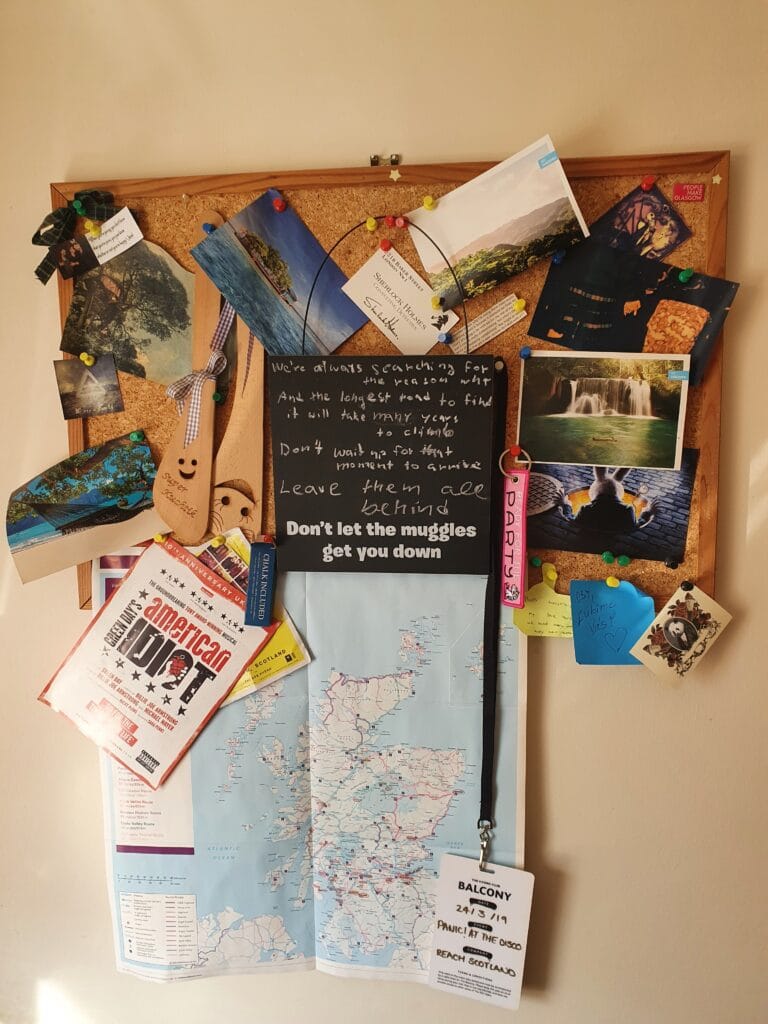
Getting started
First of all, you need to know what your plan is.
You can, technically, wing it if you are totally unhinged wild.
Take a certain amount of money, pack general stuff you might need, buy the first ticket to whatever destination speaks to you or is the cheapest flight out of your home country and then see how it goes.
If you are this kind of a person, please message us in the comments below or on our Instagram – you are like an endangered species in our eyes, and we would love to speak to you.
So while you might be that kind of a person, and it is possible to skip the whole preparation, we are all about overthinking travel here and planning loads. We like to be prepared and have things well-researched.
Note: prepared and well-researched doesn’t mean there is no spontaneity or flexibility to do things in the moment. It just means you know what kind of life you have (e.g. health issues), what kind of 💩 happens to you (hint: lots of different kinds of 💩, if you are us) and how much you want to be prepared for it.
Making a plan
We are going to assume you are more of a planner than an improviser (because really, why else would you be reading this). In that case, this is what you do:
Start by figuring out the basics.
Where you want to travel. How long for. What kind of travel you will do (backpacking? Digital nomading? Or is vanlife calling you?). Etc.
This is super important to do at the start because it will also decide your travel budget.
We talk about all that in this post on how people actually afford to travel full-time, and this one, which will show you how to calculate how much money you need to travel full-time.
Make sure to speak about all of this with any of your travel partners too, if you are not going solo travelling.
Actually, let’s talk more about that.
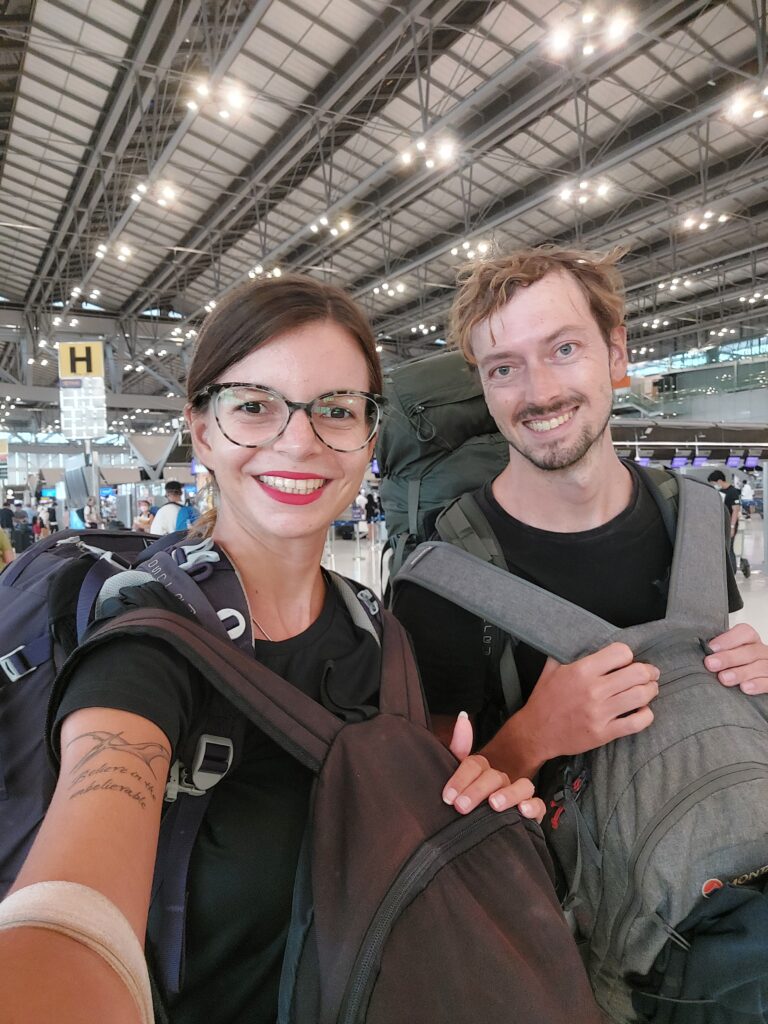
Dividing jobs
If you are going full-time travelling with someone else, have many conversations early on in the planning process. And not just about which beaches you wanna hit and what the bucket list items are for you all.
Also make sure you are both/all on the same page. You don’t want to be dealing with misunderstandings or unspoken issues when things get proper stressy one week before leaving for your big adventure.
Another tip that will make it easier to prepare for long-term travel?
Divide the to-do list.
The good thing about not being alone in this madness?
You can share the workload!
Different people have different talents and interests, so lean into that when planning, but also when on the road together.
For example, when planning travels, Daniel researches things like SIM card options or ATMs without fees (pro tip: get yourself a good travel card that doesn’t charge foreign fees). Mirka researches things to do and accommodation.
When travelling full-time and moving from one accommodation to another, Mirka organises all our possessions in one space (usually on the bed) and Daniel slots it into our backpacks TETRIS-style, because he is able to do it without losing his 💩, unlike Mirka.
Different talents, different responsibilities.
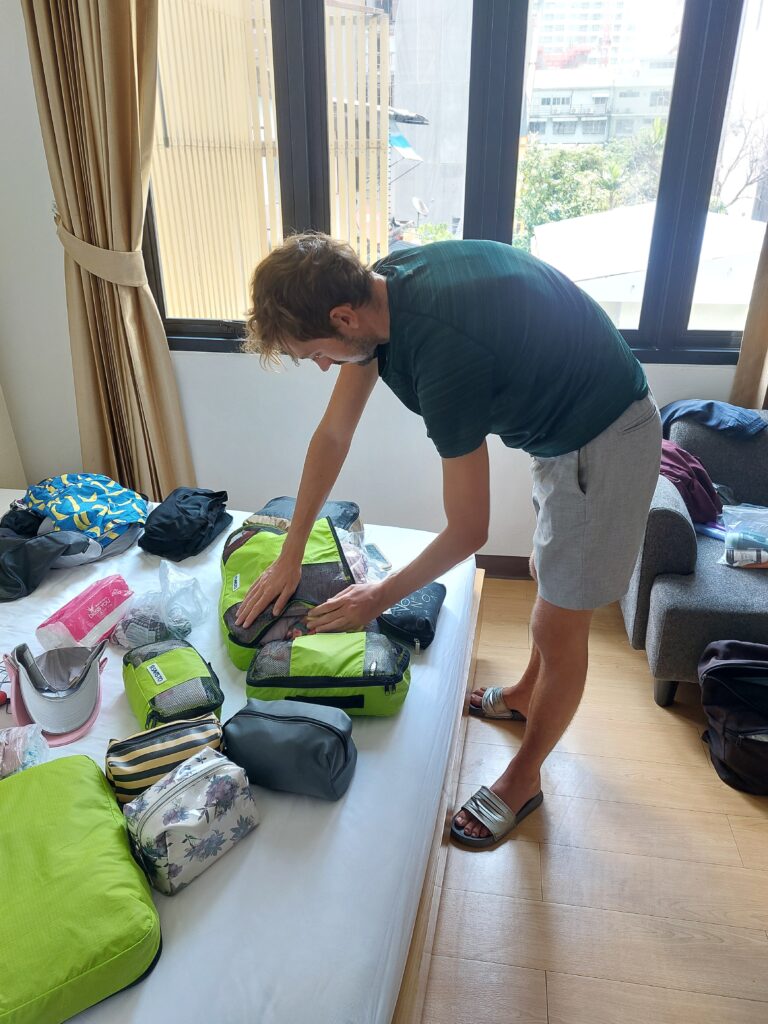
You might want to read this
We’ve already written a bit about how to prepare for full-time travel here.
That post details the 8 things you can’t forget to do before you get on a plane and set off into the unknown.
Btw, speaking of planes, we also have a post on how to make long-haul flights more comfortable, because we know 10 hours on a plane doesn’t sound like great fun to everyone. 😄
Check them both out to get extra tips which will be helpful as you set off on your full-time travel adventure.
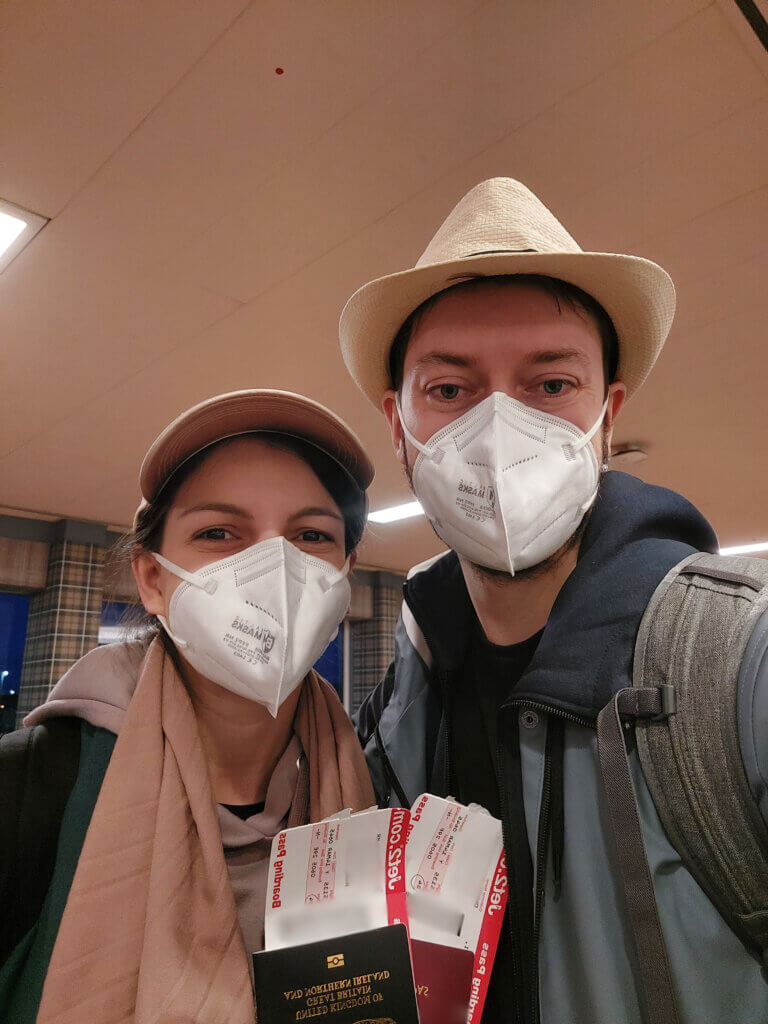
Preparing for long-term travel: the tasks
We’ll be honest with you.
Even though this post is super long (remember to save it so you can come back to it later), we won’t cover everything here. We won’t tell you every single thing you have to do to prepare for full-time travel.
Why?
Not because we are mean, but because we don’t know your specific situation. No one can tell you exactly what you have to do – you will have to figure this out yourself.
What we will do, though, is guide you along – in the next section, we’ll cover all the different things you should think about when preparing for long-term travel.
Read through the list, note down the extra tips we are sharing and then customise it based on your own situation and travel plans.
Basically, we’ll do all we can to help you, giving you all the guidance, but you have to make the plan your own.
Deal?
Okay, let’s get to it.
Note: the tasks below are in no particular order. We are including some suggestions on when it makes sense to do certain things, but you should make your own timeline based on, you guessed it, your own situation.
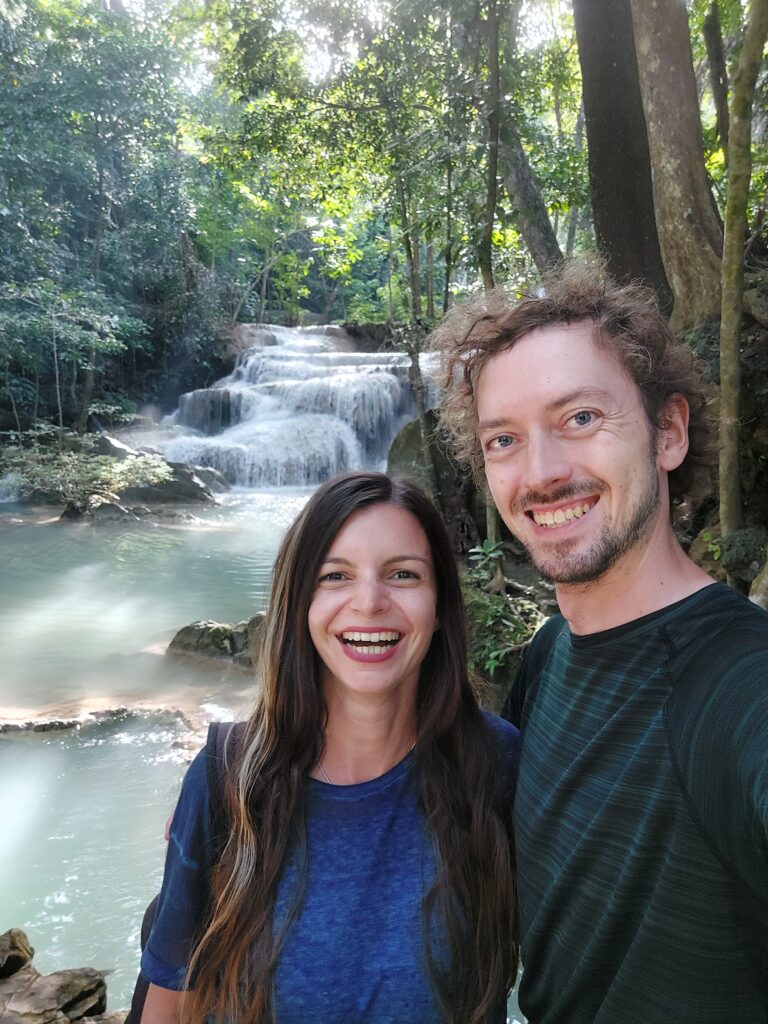
Task no. 1: Figuring out finances
Actually, task no. 1 is figuring out the basics, but we’ve already covered that here, so let’s say that was task no. 0.
We’ve decided to mention finances at the very start, because you should think about money before you start planning your full-time travel journey. That is, unless you bought Bitcoin in 2010 and are now a billionaire. (In that case, DM us on Instagram, we wanna be friends.)
We won’t go into detail here, because we’ve already covered a lot of this in Parts 1 and 2 of our Full-Time Travel Unpacked series – do check out those posts to find out how people afford to travel long-term and how to calculate your travel budget.
But we do wanna tell you more about how to manage finances when you are already travelling.

(Pictured: Money Centre in Warsaw, Poland)
Managing money on the road
Another thing you have to think about when it comes to finances and travel?
What will you use to pay for things abroad, as you travel?
This is too big a topic to cover in this post, but here are some things you should think about:
- Always carry multiple cards. Don’t rely on just one. We travel with two debit cards and one credit card as a minimum.
- Always carry some cash. The most generally accepted currency is still USD. We travel with $100 that we keep safely hidden in our backpack for any emergencies.
- When taking out cash abroad, use ATMs, rather than currency exchange places. 99% of the time, this is safer and cheaper.
- Similarly, when taking out money from an ATM, use one from a local bank, not one of those independent ones like Euronet.
- Make sure the cards you use to take out cash abroad (or make card payments) don’t charge foreign fees. That means your home bank, which issued the cards, doesn’t charge you.
- With ATMs, you also have to consider the foreign bank’s fees. Always research this before visiting a new country – are there any banks/ATMs that do not charge fees? If not, which bank/ATM charges the lowest fee?

(Photo credit: Zaostrene)
What cards do we use?
When travelling, we use Starling and Monzo cards – remember we said to always have at least 2.
They are absolutely amazing, because they let us take money out of ATMs for FREE! That means Starling and Monzo don’t charge us for taking money out abroad (but the foreign bank might, always keep this in mind).
Another reason for travelling with 2 cards is their cash limits. Both, Starling and Monzo, have limits on how much cash you can take out for free abroad. But if you have both, you can take out money using both cards for free and have more in total.
Btw, if you open an account using one of the links above, you get a freebie from the banks. 😉 (And we get one too, so it’s a win-win.)
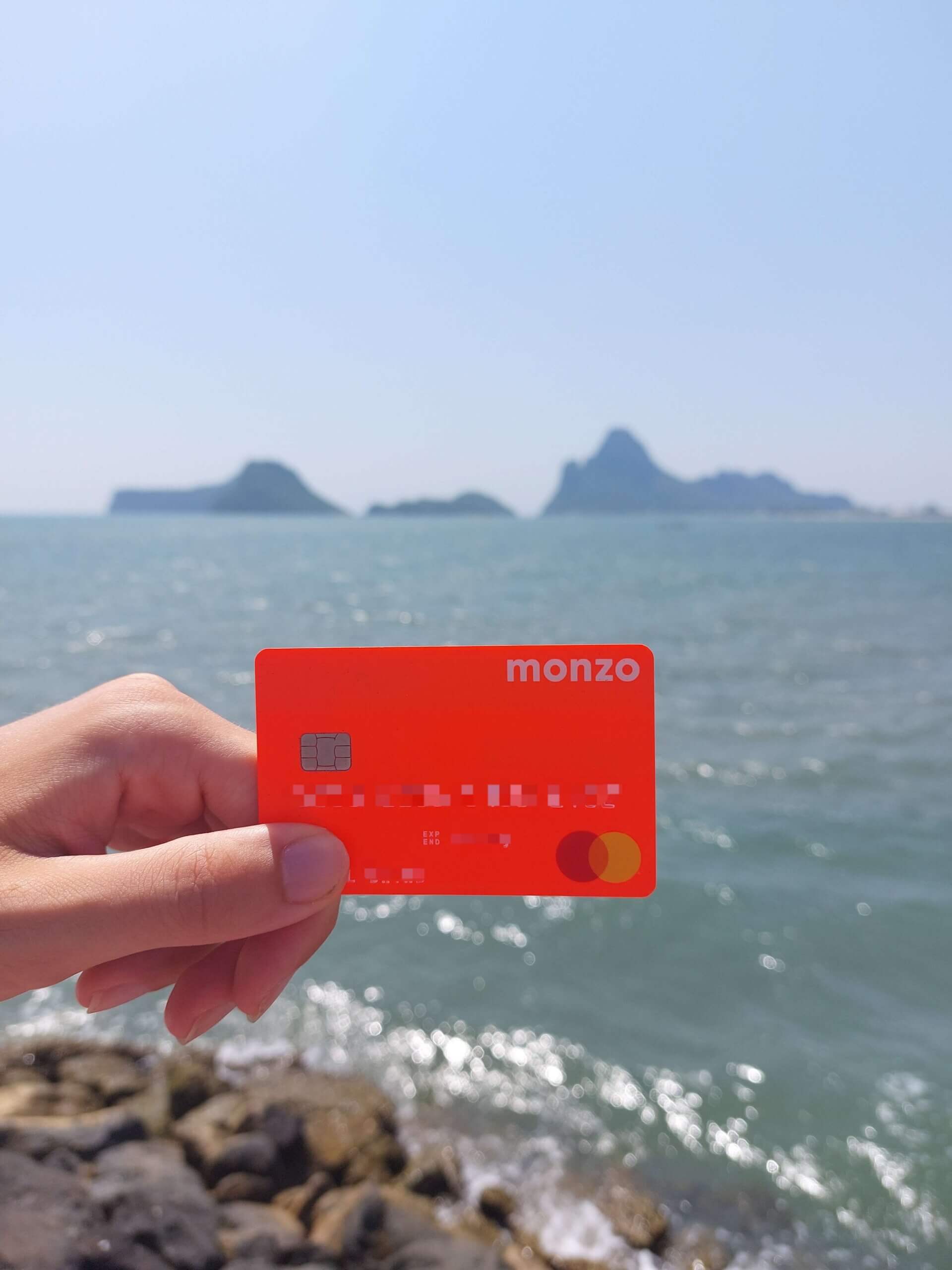
Task no. 2: Preparing for packing
The key here is the word preparing – we are not yet talking about the madness that will be the actual packing.
The truth?
If you prepare well, packing will actually be okay.
Because you will know what you are packing, how you are packing it and you will also know all the extra tips and tricks on making it all work!
How to prepare for packing
- First, read this post, which is full of tips on how to pack for full-time travel. It’s part 3 of our Full-Time Travel Unpacked series, so don’t skip that.
- We also have a whole section on our blog full of packing tips, so have a look there to learn even more tricks to make this work.
- Once you learn all the tricks for how to pack, you can go on creating your own packing list.
- Next step? Buying any travel gear you are missing! (Just a note, this is a major oversimplification. For example, it took us over 2 months to find a backpack for Mirka. Shoes were another pain in the butt – that’s why we wrote this guide. Basically, give yourself plenty of time to source all your gear.).
Just a little note here: don’t go crazy thinking you have to buy everything new, to make sure you prepare for full-time travel well.
It’s better to pack light and then buy a few more things on the road than to overpack. Trust us, as travellers who were convinced we did not overpack, only to discover that yes, yes we did, packing less is the way to go. Otherwise, you will be counting down the days till the moment you can dump half of your backpack’s contents at your family’s house for storage (based on personal experience 😬).
Packing tips are not the only ones you should learn about, though.
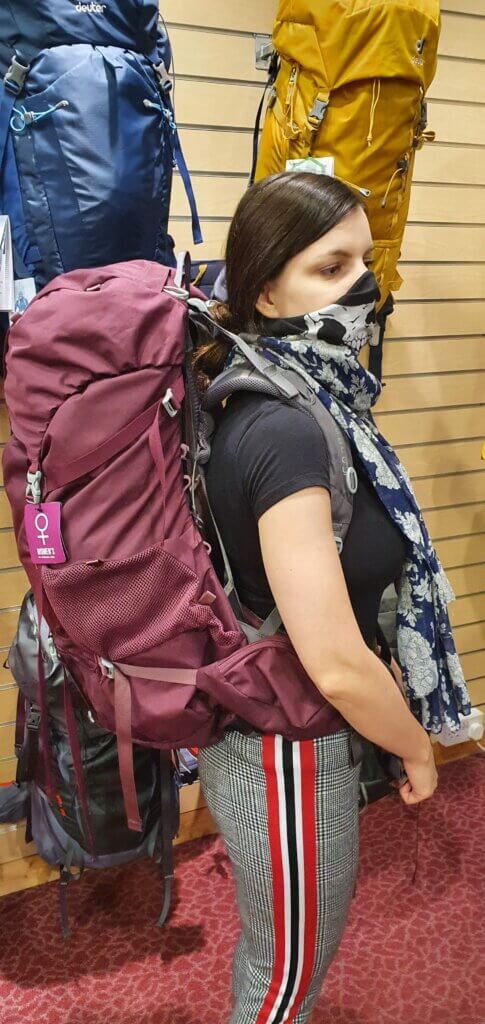
Task no. 3: Transforming travel
You might have noticed we are being a little fancy with our headings here and throwing in a bit of alliteration for style.
How can you transform travel, though?
Easy. By learning different travel tips and tricks, that will make your travels easier and better.
We’ve already talked about the packing tips – crucial, since a backpack or a suitcase will become your home soon (unless you are going for van life, but even then you do have to cut down your possessions big time).
Another important thing you should think about?
Safety
This is, again, a big topic, which is why we have a full section on our website with all the tips for staying safe on the road – make sure to check it out.
We also have a general travel tips and tricks section where we post all the random hacks we’ve discovered over the years – like the £1.34 product that might save your phone.
You can go travelling without knowing all of these hacks, but learning them will definitely improve your experience (and not leave you crying at the beach because someone stole all your stuff while you were floating in the sea on a giant flamingo).
So go on, read the travel tips, transform your travels and thank us later (we accept payment in the following currencies: lifelong friendship, chocolate, quirky cocktails).
Now, onto the real fun stuff! (Not)
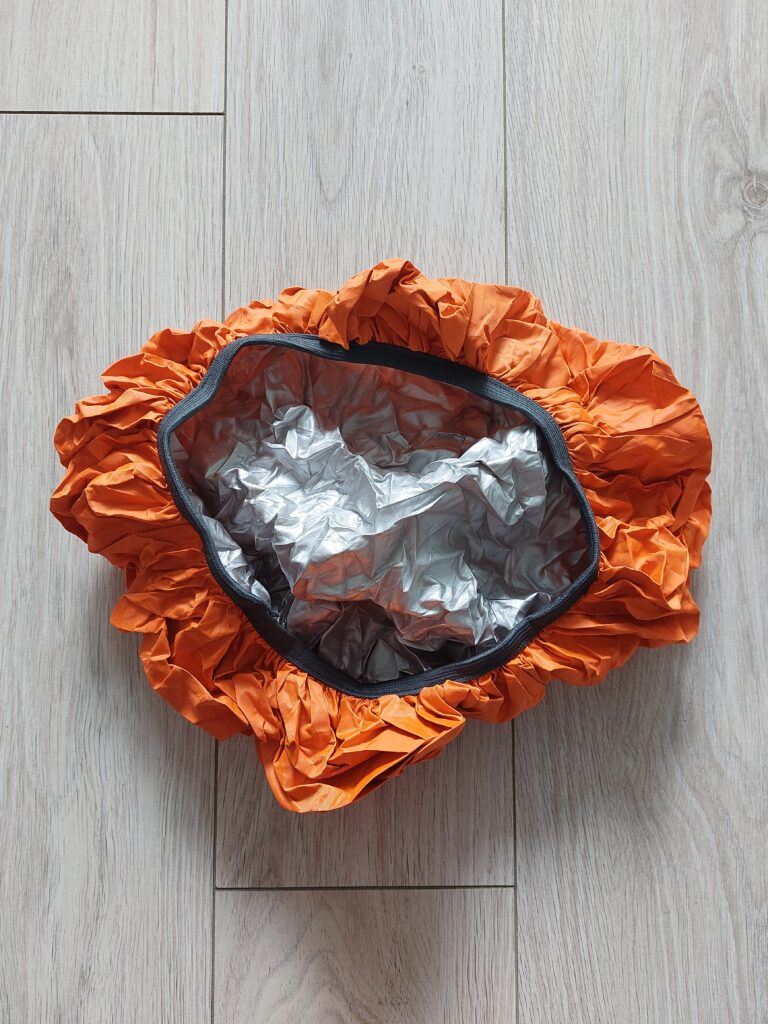
Task no. 4: Mind the medical
Sorting out your health as much as you can before leaving is a great idea.
Now, we don’t mean that you should go on a diet, start taking cold showers and sign up for vitamin C IV drips.
Although taking care of yourself prior to your full-time travels is not a bad idea – travelling is tough. Your health will most likely suffer, so going into it strong is smart.
What do you have to think about when it comes to health?
- Figuring out what vaccinations you might need. See if you can get a pre-travel consultation at your GP, local health clinic or another provider (In the UK, for example, these are also offered by pharmacies and drugstores, like Boots and Superdrug). Discuss your health with a medical professional at the appointment and then make a plan for getting your vaccinations.
Keep in mind that some take a long time. For example, we decided to get the rabies vaccination, which took 5 weeks to complete. Also, take into consideration that you might be unwell after the vaccines, so you really don’t want to be getting them just before leaving – imagine packing up your house while also feeling totally under the weather! - Getting your check-ups done before you go travelling. This is a pain in the butt, but trust us, it’s much better knowing you got your teeth, eyes, asthma, cervical cancer etc. all checked out. Especially if you are planning on travelling for years.
- Sorting out your medication. Some questions to consider here: do you take any medication that you will be travelling with? How much of it can you get from your doctor at once? Can you travel to all the countries with such a big amount? Have you got an official letter from your doctor that can prove to any officials that this really is medication you need and not some fun pills you are transporting?
- Building a first aid kit. Two things here we wouldn’t recommend: 1. Going overboard. That is what we did – we carried 2 first aid kits with us.
Guess what we used from them in almost 2 years of travelling?
Primarily just paracetamol. Of course.
2. We also wouldn’t recommend buying a premade first aid kit. It’s better to build your own; otherwise, you do risk taking pointless stuff and possibly also missing things that you, personally, might need.
Don’t underestimate planning the health aspect of your travels, especially if you are travelling with any medical conditions and/or kids.
There is one more thing that’s necessary when it comes to health and travel, but we’ll talk about it in the next section (it’s another fun one 😝).
Task no. 5: Paperwork palaver
Ohhh, paperwork, how we love you.
Not.
Here is the truth.
How to prepare for full-time travel?
By suffering through all the paperwork pain.
There will be A LOT of paperwork.
In case nobody told you: society is set up for people to stay on their butts, in the same place, forever. Not for people to move around, see the world and enjoy life. But that’s a topic for another conversation. Now we have to discuss the bane of our existence: paperwork.

Paperwork you need to think about:
- Sorting out any visas. This doesn’t necessarily mean applying for all visas while you are still at home. What you should do is make a list of the countries you want to visit, their visa requirements and the process of applying.
Pro tip: double-check the information when you actually get closer to applying for the visa, because the requirements often change. For example, our notes we took when preparing for full-time travel said visa to Indonesia is free. Imagine our surprise when we rocked up to passport control in Bali only to be told we each had to pay IDR 500,000 (around £23 at today’s conversion [July 2025])!
Btw, this is why we are signed up for travel safety alerts – not just to stay safer as we travel, but also so we are notified about any changes in visa requirements. - Speaking of visa, make sure you take extra copies of visa-style photos of yourself and everyone else in your travel party with you. You never know when you might need them.
- Super important: make sure your passport and other documents (national ID, driver’s license etc.) are all not just valid, but also meet any entry requirements for your destination, like having enough blank pages or at least 6 months’ validity left.
- Make copies of everything that is important. Take paper copies of your passports and any other important paperwork with you, in your hand luggage. It’s a digital world, but paper copies can still come in handy, especially when travelling foreign lands.
Equally, though, don’t just rely on paper copies. Your luggage can get stolen, or it might all get soaked (pro tip: be prepared). All your travel paperwork should be scanned and saved somewhere as digital copies, too.
Put this down as one of the tasks to do closer to the time of your departure – get all your paperwork together, scan it all, save it somewhere safe and print physical copies.

Don’t forget this
We mentioned there is one more health-related thing you’ve got to consider.
And it’s a paperwork task too.
Did you guess it?
Travel insurance!
We’ve talked about travel insurance a few times on our website, so we won’t take up your time in this post.
Here is what you should do:
- Check out our 11-question test – these are the 11 questions you should be asking about your potential travel insurance provider BEFORE you buy from them.
- If you want some suggestions for amazing travel insurance providers, we use SafetyWing and True Traveller. If you want to know more about True Traveller, we wrote our review here. (SafetyWing review is coming soon.)
- Read our review and advice, but do your own research. We are not financial advisors or experts on travel insurance, and it’s important that you make the right decisions that suit you and your travel plans.
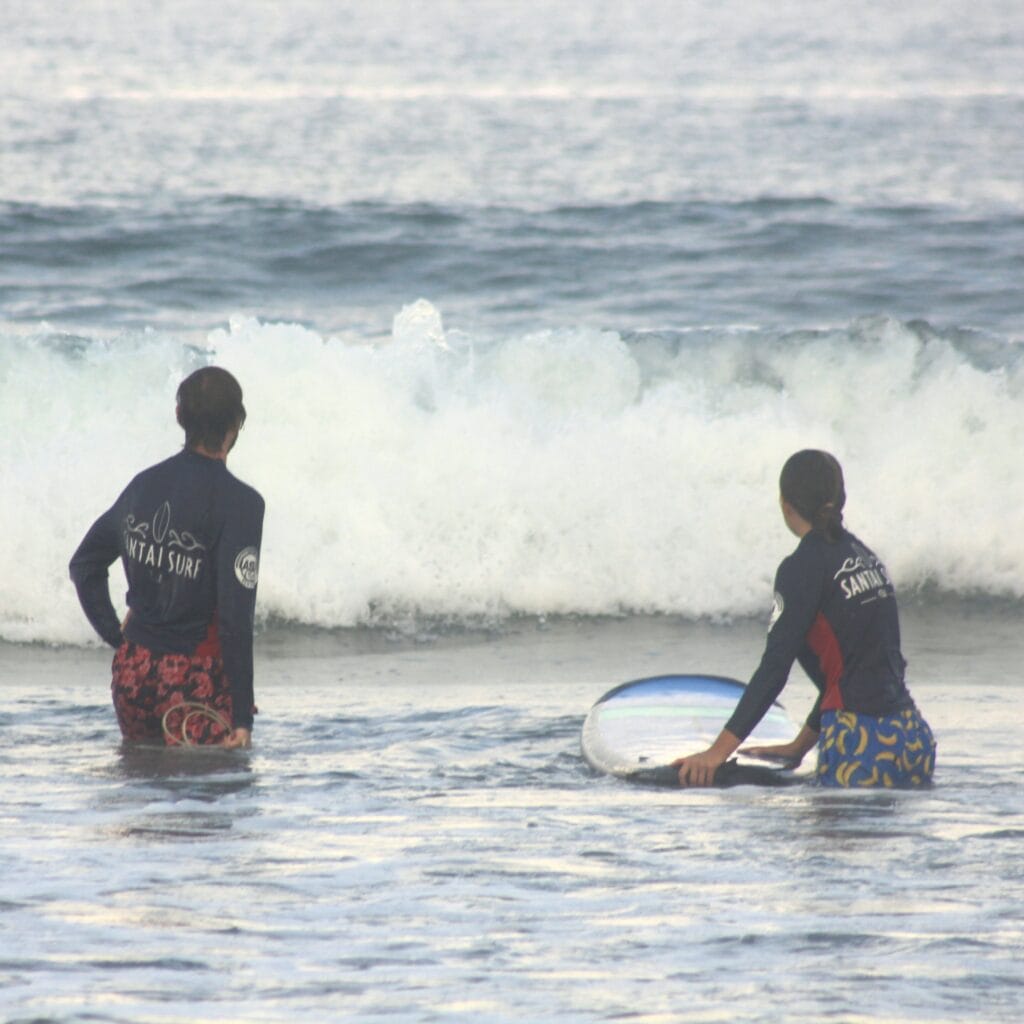
Task no. 6: Cool countries are calling
One of the most common questions we get about full-time travel is: how do you plan on the go? Or do you pre-plan it all?
We’ll cover this in detail in part 5 of our Full-Time Travel Unpacked series, so make sure to subscribe to our newsletter so you get notified when it goes live. For now, we’ll tell you that, unless you are wild, you do have to pre-plan, at least some of it.
The why and the how
Why do you have to pre-plan?
Two main reasons:
- Full-time travel is not easy. There is so much to see and do, but you also have to try and stay in touch with your friends and family, make new travel friends, stay on top of any home life admin, clear and back up your pictures regularly (don’t not do this and then have regrets when you drop your phone into the sea and lose a year of memories) (also, for these situations, get a waterproof phone cover), keep a travel journal, track your expenses etc. etc. While constantly on the go. It’s FUN!
So imagine doing all of the above and not having anything researched and planned in the countries you are visiting, and having to do it as you go. HAHAHA. Yeah right.* - You will want to live every second of your full-time travel. You will wanna sightsee, swim, eat, chill, read, sunbathe, chat with new friends, party, climb mountains and all of the other things. You will not want to be spending your time bent over your tiny phone screen trying to research accommodation in the next place you are heading to.
*We know that some travellers are able to travel like this. Usually it depends on the kind of person you are, how much 💩 you’ve had happen to you on the road and how much you care about what kind of experience you have (what you see, whether the places you eat at are good and clean, the level of comfort at your accommodation etc.).
If you are like us – we like to have at least some info and a plan, a lot of 💩 happens to us and we are 30+ so we have standards (when it comes to certain things! We still do plenty of crazy travel stuff others judge us for) – then you will want to research and plan ahead.
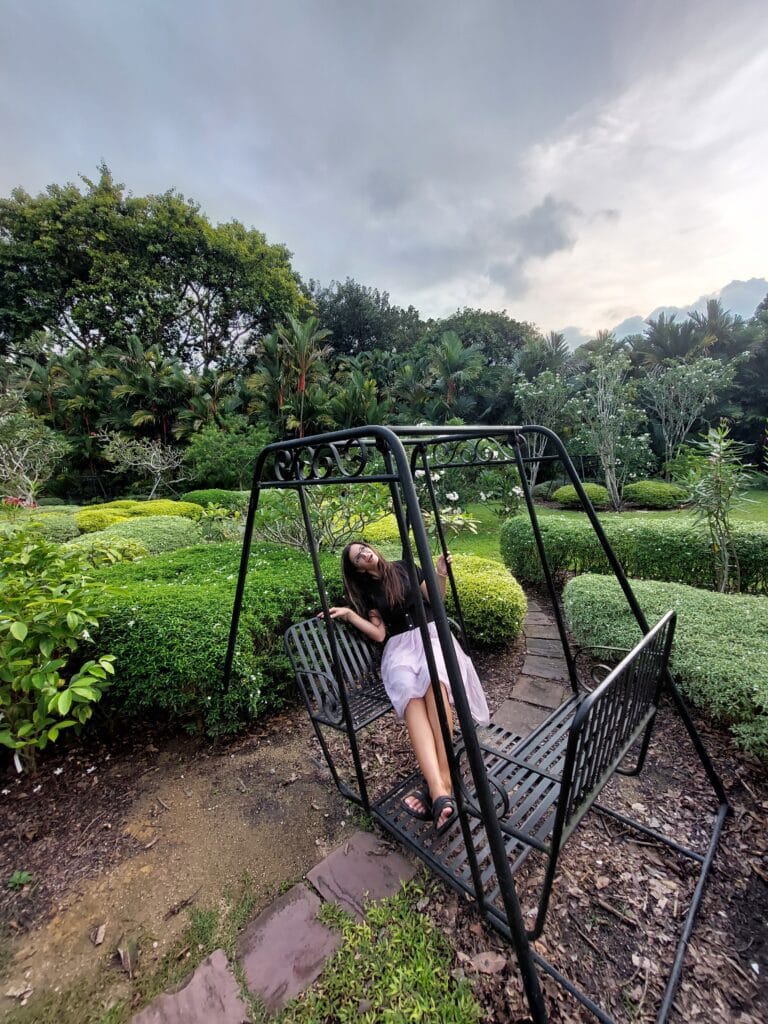
(Pictured: Botanic Gardens, Singapore)
How do you pre-plan?
Again, more info coming in Part 5, but what we did was:
- Created an approximate list of countries we were planning on visiting during our full-time travels.
- Researched the different sights/cities/places that are worth visiting there (using primarily travel blogs, but do whatever works for you – Youtube, Pinterest, Insta, TikTok, wherever you get your inspo).
- Collated info into Google Docs – one per country – sights we were planning to visit in each city, entry fees, how many days to spend in each place etc.
- Ironed out the details as we went along.
What we would change next time
Was this the best approach?
At the time, probably yes.
When you are going into full-time travel for the first time, you have no idea what it will be like.
For us, it turned out to be a lot tougher than we thought – we had a lot of bad stuff happen to us, got tired early on, struggled travelling without driver’s licenses etc. If you want to know more, read this post, though beware, it gets quite personal.
It also turned out that a lot of the information we read and relied on wasn’t true or accurate (lesson learned: pick your sources well).
Lastly, we wished we had researched some things less and other things more.
It’s a process you get better at as you spend a longer time travelling, but again, more on that in Part 5. Sign up for our newsletter – we will let you know when the post is out!
How to prepare for full-time travel, eh? What a fun experiment to put yourself through. 😅

Task no. 7: Onto organising!
A big task you will have to tackle?
Getting stuff organised at home. Basically, preparing everything for your departure, so you don’t end up running around like a headless chicken the week before you leave.
What you should think about
Here are some examples of the things you’ve got to think about (sadly, thinking about pizza and cocktails at the beach all day long will not actually get you anywhere):
- What are you going to do with your current property, if you own it? Sell it? Rent it out? Turn it into a haunted house experience? (Please go for the last option and invite us for the opening night.)
- How will you pack up your home, and where and how will you store your possessions? (Key here is starting early. We talk about it more in this post).
- Cancelling all your subscriptions. Netflix, gym, Amazon Prime, meal delivery etc. etc. If you do this early on, it becomes a really good money-saving trick too.
- Mail management. Who will take care of your mail when you are away? If you are giving up your home permanently, make sure you redirect your mail. Again, more info on that is here.
- Make a timeline for all the notices you have to give. At work. At your gas/electricity/internet company. Anywhere where you have to notify people.
- Speaking of, notify everyone about your departure and change of address, if applicable.
- Plan goodbye parties (unless you are like us and don’t tell anyone you are leaving, other than our closest family members😄).
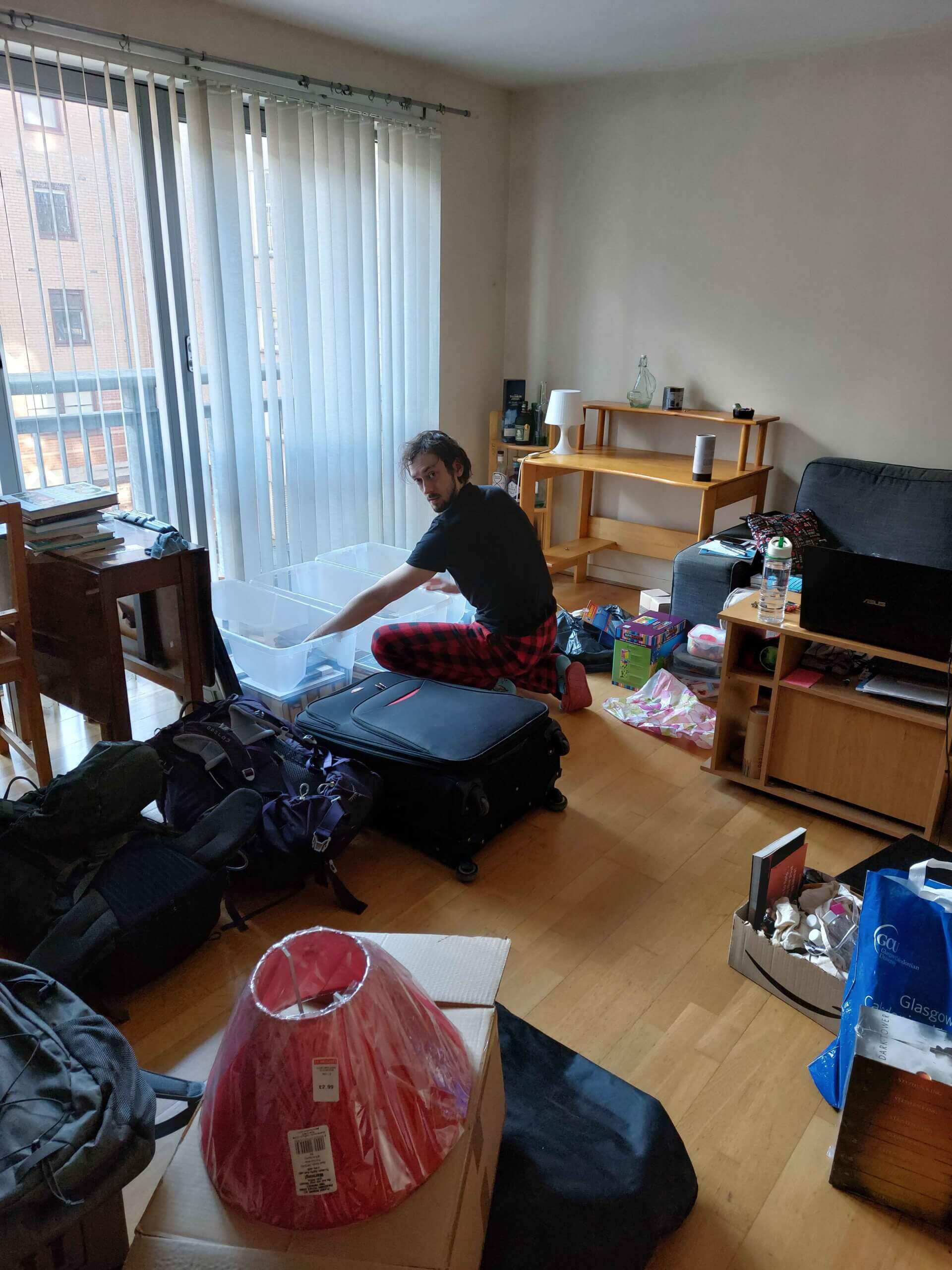
Pro tip
Start getting organised early on. That doesn’t mean you actually have to start notifying providers and setting up a group chat for a leaving brunch.
But start creating a to-do list and a timeline as you go about your day-to-day life.
Got a bill for electricity? Add the company to your to-do list and timeline.
Received an annual letter from the council? Add “check how to notify council” to your to-do list.
You can start this process early – even a year or two before you actually leave for your travels.
The benefits of this approach
There are 4 benefits of doing it this way:
- You are less likely to forget to do something, as you will have a record of everyone you deal with.
- You will feel like you are making progress on your travel plans, even if you can’t yet leave because you haven’t saved up enough money/haven’t finished your degree yet/haven’t completed your work contract etc.
- You will feel less overwhelmed in the last few months before your departure, because you will have spread the work out across months or years.
- You can reuse this “what to do and who to contact” list in the future. We keep a list like that (and keep it up-to-date) for whenever we move and have to change our address or change our phone numbers. It also came in handy when we got married and Mirka was updating her surname everywhere!
If you got to this part of the post, we’ve got good news. We are nearly there – you know almost everything you need to do to prepare for full-time travel.
One last thing you can’t forget?
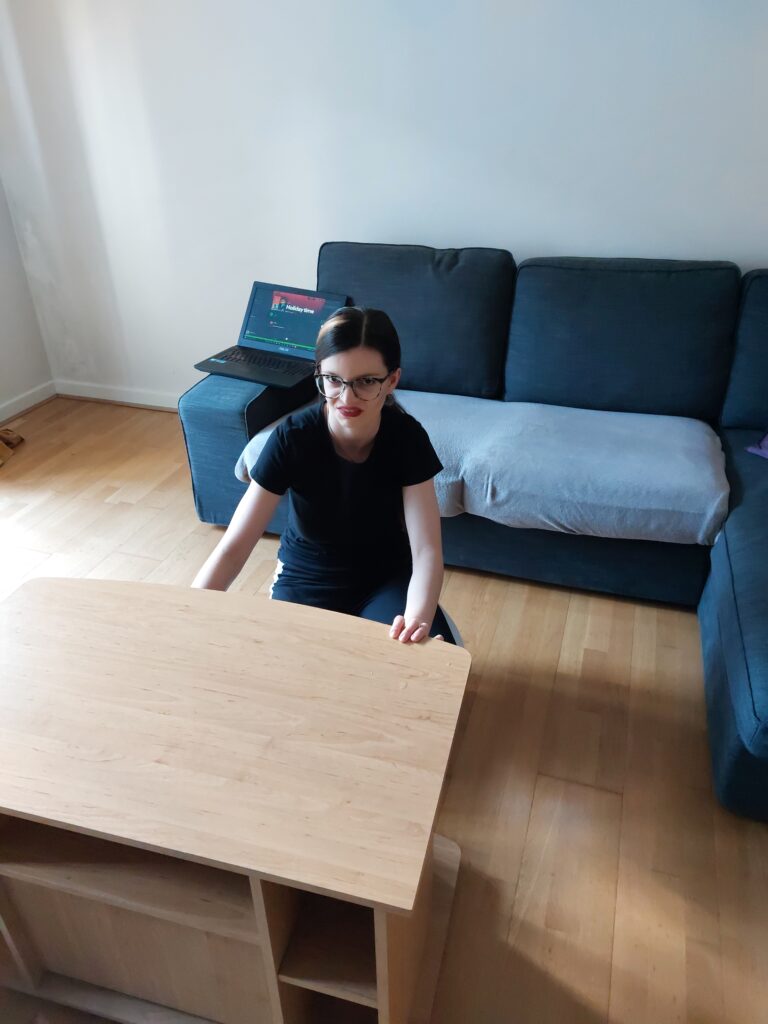
(As you can see, it was one of our favourite pre-travel tasks! 😄)
Task no. 8: Booking time b*tches!
Wohooo, you’ve made it! All the way to the end of this horror show that is preparing for long-term travel.
And what reward awaits you at the end?
Actually booking the start of your trip!
This is another common question we get.
How much should you book in advance?
This, as always, depends on your situation.
We know people who book as they go – literally the day or so before moving to their next destination, they are booking accommodation there.
This lets them adjust their plans as they want – if they like a place, they can stay longer, if they don’t like it, they can move on.
We only did this a few times – it’s too stress-inducing. 😅
Here is what we do instead.

What we do
At the start of our full-time travel journey, we had 2 months of volunteering in Italy arranged.
So all we booked in advance was, obviously, the volunteering, and the flights to Italy.
We did also have a week of onward travel through Italy booked, after finishing volunteering, but that was because it was Daniel’s 30th, so we had it all planned out.
The rest of our trip?
We booked as we went along, usually booking accommodation and flights at least a few weeks in advance (the rest was situation-dependent).
For example, we booked our flights to Thailand while volunteering in Italy. It was wild times – one moment you are cleaning the pool, next you are booking a one-way flight to a new continent.
What you should think about when booking in advance
How flexible and spontaneous you can be depends on a variety of factors.
For us, these are the reasons we, most of the time, book in advance:
- As we mentioned, we need a certain level of standard and comfort when it comes to accommodation, so we like to have a good selection when choosing.
- We don’t drive, so we are very limited with accommodation options, especially in places with non-existent public transport (hello Southeast Asia). This limits our accommodation options, so we prefer to secure places before they get booked out.
- Saving money is important, and the good value-for-money places always get booked out first. Same with flights. To save money, we like to book in advance.
- We don’t want the stress of not knowing where we’ll sleep the next day.
- Constantly planning, researching, and booking is tiring. We prefer to sacrifice one afternoon to get a few weeks’ of accommodation booked, rather than having to spend time every few days booking as we go.
Think about your situation. If you have kids, you might want more stability than if you are a single 20yo who can sleep under a bridge and wake up without a back pain (if you are btw, enjoy this time. We have to tell you, it won’t last).
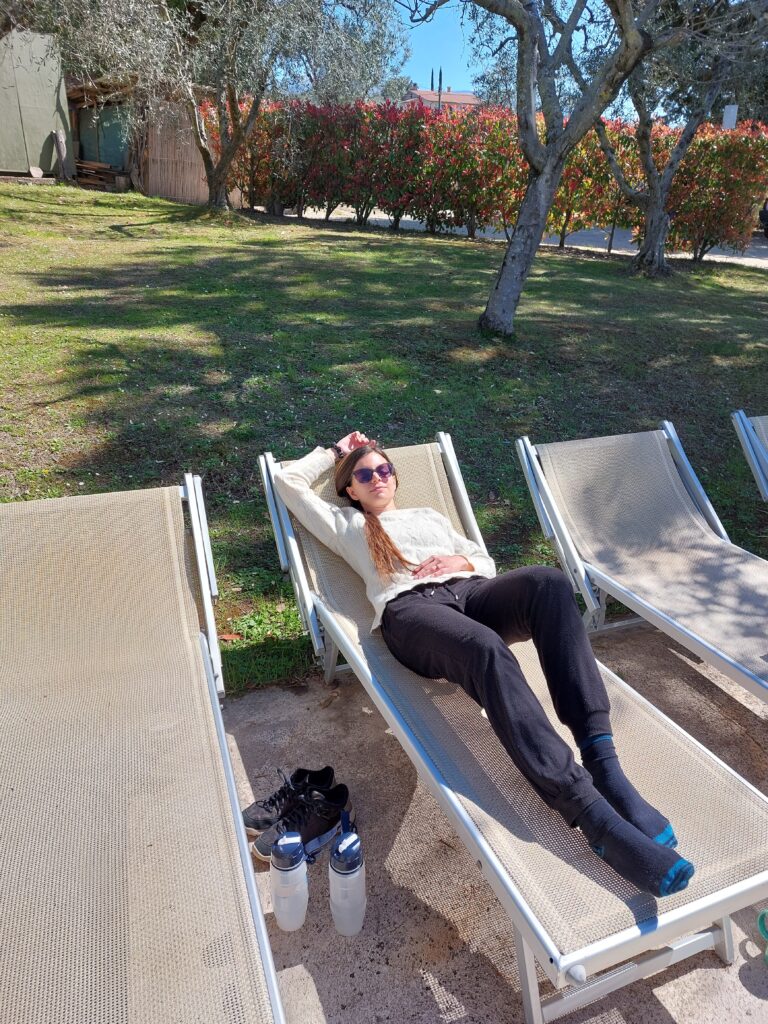
Booking at the start of your trip
Our advice for how to prepare for full-time travel?
Book, or at least plan, everything for the very start of your journey.
The beginning will be chaotic. Everything will be new. You will need to get used to being on the road, possibly living out of a backpack or spending 24/7 with your family or partner or friends. Or you might just be jetlagged as hell, if you are crossing half the planet to get to your first destination.
The rule when going somewhere new is to always have at least one night of accommodation booked for safety. You don’t want to be landing late at night, tired and then, looking like an obvious first-time visitor, wander around trying to find a place with an available room.
But at the very start of your journey, we would suggest you book and plan everything, not just the first night.
How long for?
Depends on what makes you feel comfortable. Does knowing exactly where you’ll sleep and how you’ll travel for the first 2 weeks make you feel calm? Or 3 weeks? A month? You decide.
Just make sure you’ve got the start of your trip planned and booked before you go.
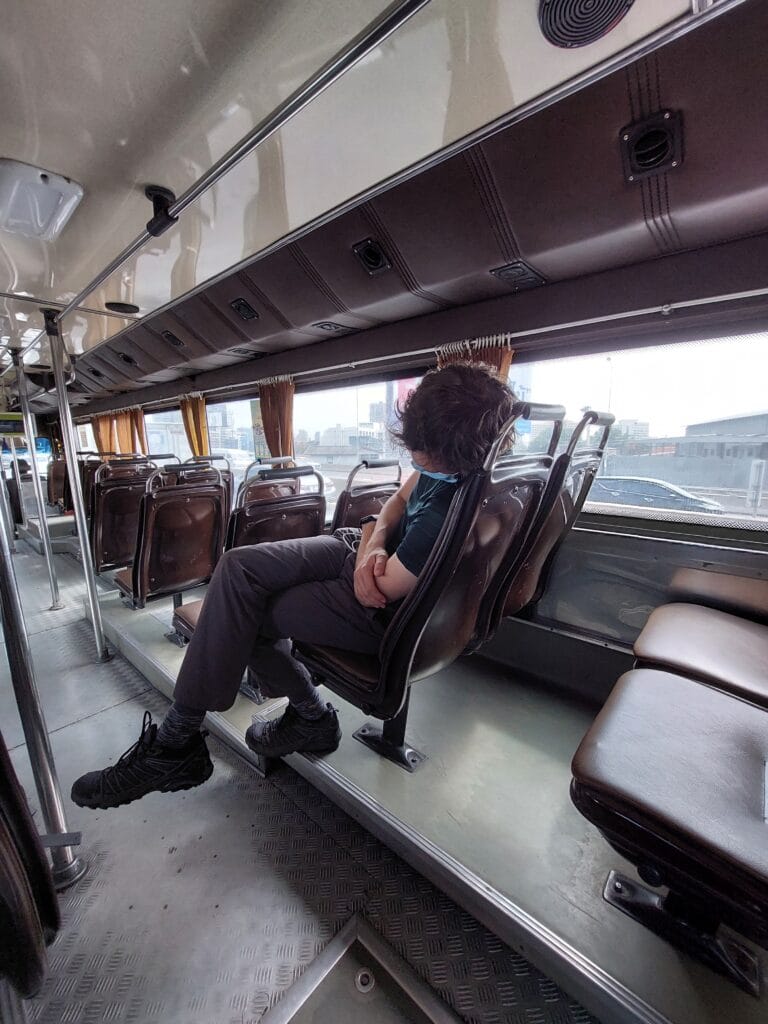
(Pictured: on a local bus from the airport in Bangkok)
Let us congratulate you – you’ve made it to the very end, and now you should know how to prepare for full-time travel.
If you are still unsure about anything:
- Check out the rest of our Full-Time Travel Unpacked series for more info and tips
- Ask questions in the comments below or in a DM on our Instagram
- If you need more help, book a call with us so we can tackle it together
Happy planning! (Lol, as if!)
PS: remember to voice your opinion on those Pina Coladas in the comments! 🍹
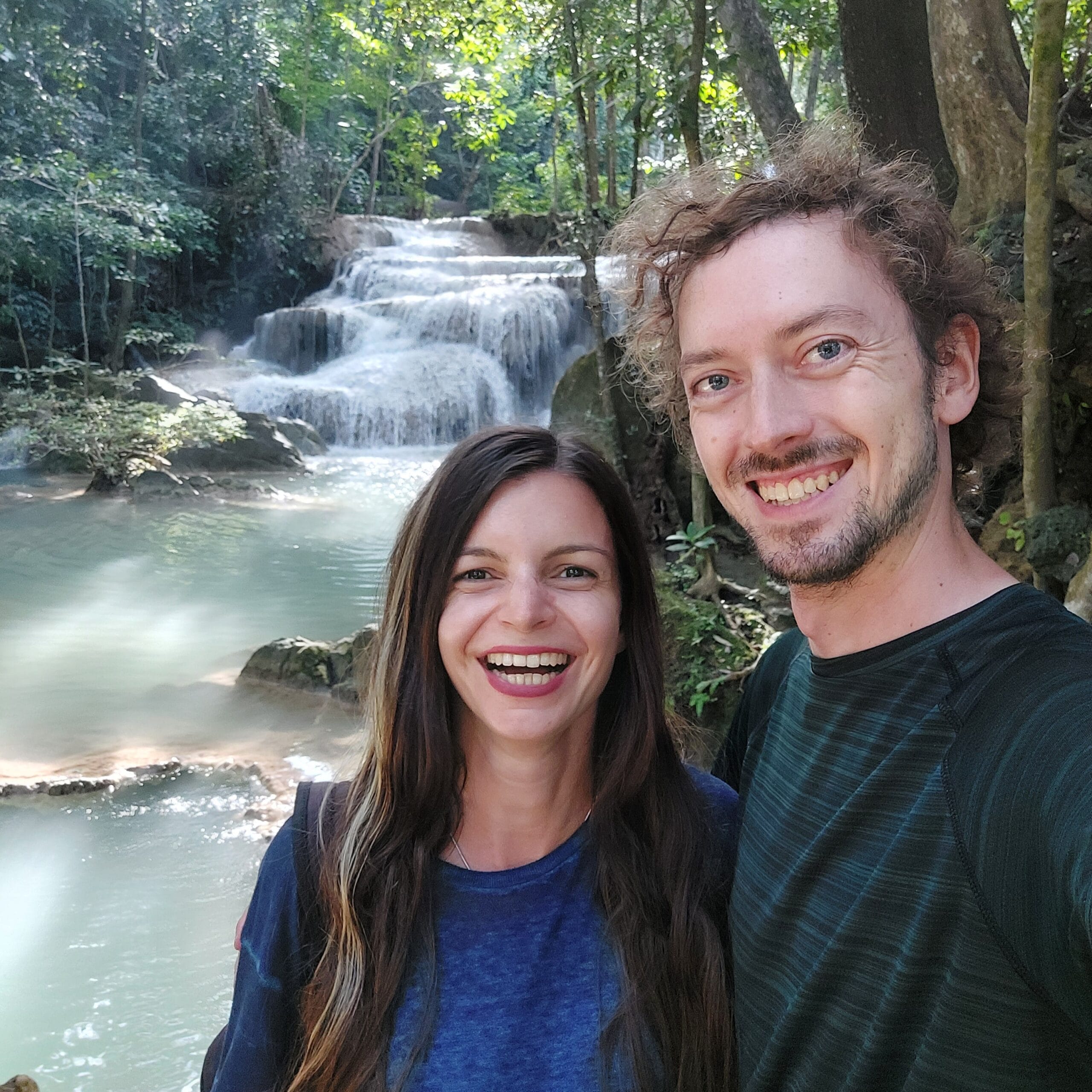
Hi!
We’re Mirka & Daniel — full-time travellers, professional overthinkers & bad luck magnets. We research EVERYTHING and then share all the weird travel tips with you here. Follow along to make your adventures easier! 🌴

